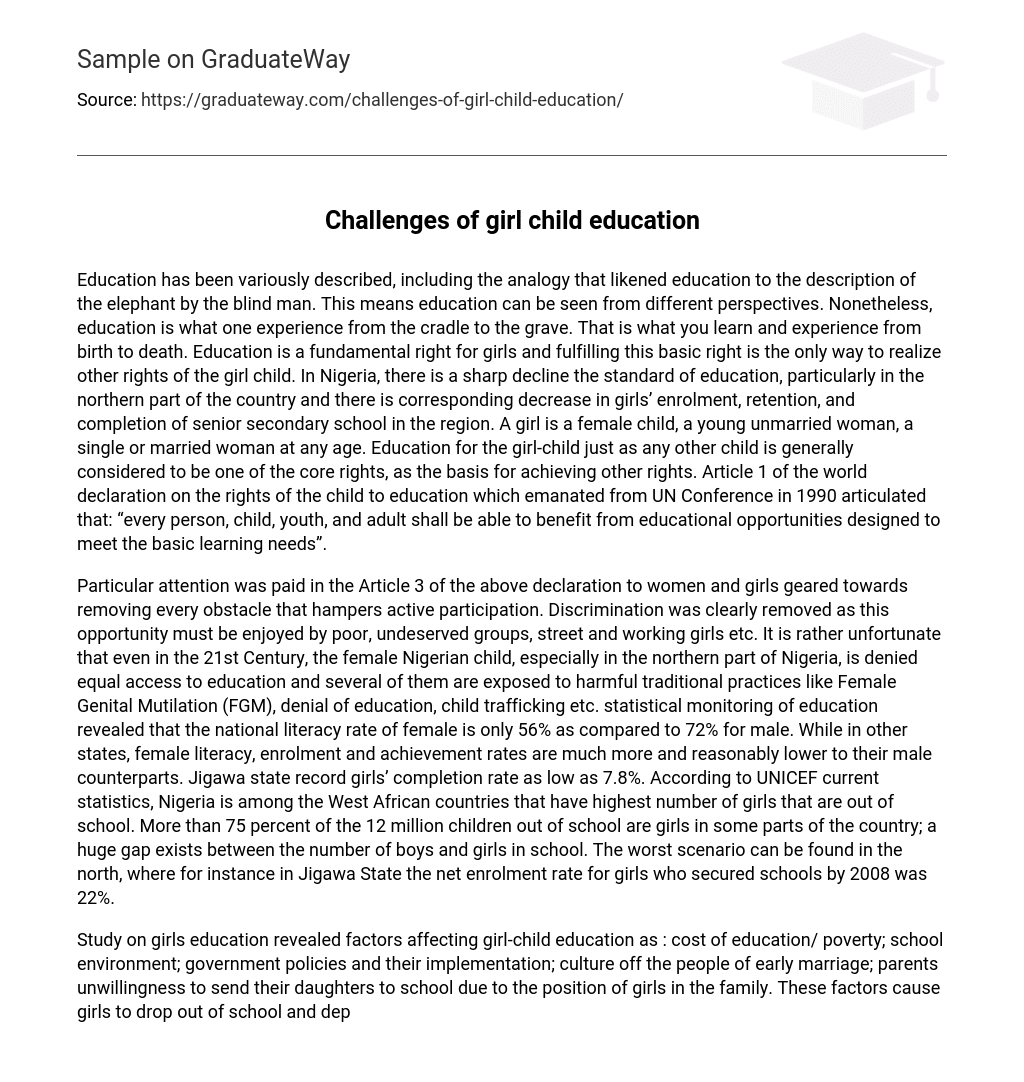Education has been variously described, including the analogy that likened education to the description of the elephant by the blind man. This means education can be seen from different perspectives. Nonetheless, education is what one experience from the cradle to the grave. That is what you learn and experience from birth to death. Education is a fundamental right for girls and fulfilling this basic right is the only way to realize other rights of the girl child. In Nigeria, there is a sharp decline the standard of education, particularly in the northern part of the country and there is corresponding decrease in girls’ enrolment, retention, and completion of senior secondary school in the region. A girl is a female child, a young unmarried woman, a single or married woman at any age. Education for the girl-child just as any other child is generally considered to be one of the core rights, as the basis for achieving other rights. Article 1 of the world declaration on the rights of the child to education which emanated from UN Conference in 1990 articulated that: “every person, child, youth, and adult shall be able to benefit from educational opportunities designed to meet the basic learning needs”.
Particular attention was paid in the Article 3 of the above declaration to women and girls geared towards removing every obstacle that hampers active participation. Discrimination was clearly removed as this opportunity must be enjoyed by poor, undeserved groups, street and working girls etc. It is rather unfortunate that even in the 21st Century, the female Nigerian child, especially in the northern part of Nigeria, is denied equal access to education and several of them are exposed to harmful traditional practices like Female Genital Mutilation (FGM), denial of education, child trafficking etc. statistical monitoring of education revealed that the national literacy rate of female is only 56% as compared to 72% for male. While in other states, female literacy, enrolment and achievement rates are much more and reasonably lower to their male counterparts. Jigawa state record girls’ completion rate as low as 7.8%. According to UNICEF current statistics, Nigeria is among the West African countries that have highest number of girls that are out of school. More than 75 percent of the 12 million children out of school are girls in some parts of the country; a huge gap exists between the number of boys and girls in school. The worst scenario can be found in the north, where for instance in Jigawa State the net enrolment rate for girls who secured schools by 2008 was 22%.
Study on girls education revealed factors affecting girl-child education as : cost of education/ poverty; school environment; government policies and their implementation; culture off the people of early marriage; parents unwillingness to send their daughters to school due to the position of girls in the family. These factors cause girls to drop out of school and deprive them from pursuing their education. It is also linked to early sexual initiation, and early exposure to reproductive risk, and unattended first birth, and related health and social problems like Vesico Vaginal Fistula (VVF), divorce, broken homes etc which by extension has its attendant consequences on the society. The prospects of girl- child education cannot be quantified. It is a common adage that says; “when you educate a woman, you educate a home and a nation, and in turn the society will be better for it”. The unique and far reaching benefits of educating the girl-child include the proven fact that educating her is the best investment for societal development. The short and long term benefits to girls are based on the evidence that educated girls develop essential life skills, including self confidence, the ability to participate effectively in society and protect themselves from HIV/AIDS infection, sexual exploitation, and pressures for early marriage and child birth. Above all, it provides for equal rights, equal opportunities and progress for all.
Despite the above mentioned benefits to girl- child education, yet a lot of challenges bedevilled it particularly in the North just as there is the problem of boy-child education in the South East. However, the way forward could be adopting the following: girls need a safe and supportive environment, free from abuse, with separate toilet facilities, safe drinking water, equal attention with boys and a gender sensitive curriculum. The school curriculum also needs to be revisited, to ensure gender and cultural sensitivity and to include life skills, HIV/AIDS education, citizenship and conflict resolution. Non-formal education, essential to increasing access for out of school girls, needs to be accredited as a complementary means of learning. Nomadic and Quranic forms of education require our support towards building a more effective and comprehensive curriculum. Child protection measures also need to be implemented to prevent exploitation that all too often keeps children, especially girls, away from school.





